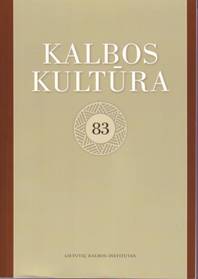Bendrinės kalbos normintojai ir besikurianti skaitmeninio modernizmo visuomenė
Prescribers of standard language and the emerging modern digital society
Author(s): Rita MiliūnaitėSubject(s): Applied Linguistics, Baltic Languages
Published by: Lietuvių Kalbos Institutas
Summary/Abstract: The article presents the changing perception of language prescribers and users, or authoritative personalities and target audiences, and their role in the development of Standard Lithuanian. One of the changes involves a shift from an authoritative personality (Jonas Jablonskis) to an institutionalized state authority or, currently, an anti-authority. The criticism of authorities and the traditional standardization process as well as different attempts to apply liberal unrestrictive norms could be accounted for by a natural development of post-modern ideas and shifts in the post-soviet Lithuanian society. The beginning of the 21st century, however, marks the end of the post-modern consumer society and brings out new artictic and philosophical cultures and directions whose appearance has been mainly stimulated by globalization and new technologies, the Internet among them. One of the most distinctive interpretations of the postmodern transformation is the concept of the digital modernism. It proposes a structural view of cultural changes in the modern society. The author of the article relies on the ideas of the modern British culturologist Alan Kirby to distinguish peculiarities of the digital modernism. These peculiarities may contribute to a better understanding of social processes and, consequently, ease the current tension between languageprescribers and the society at large.
Journal: Bendrinė kalba (iki 2014 metų – Kalbos kultūra)
- Issue Year: 2010
- Issue No: 83
- Page Range: 98-118
- Page Count: 21
- Language: Lithuanian

